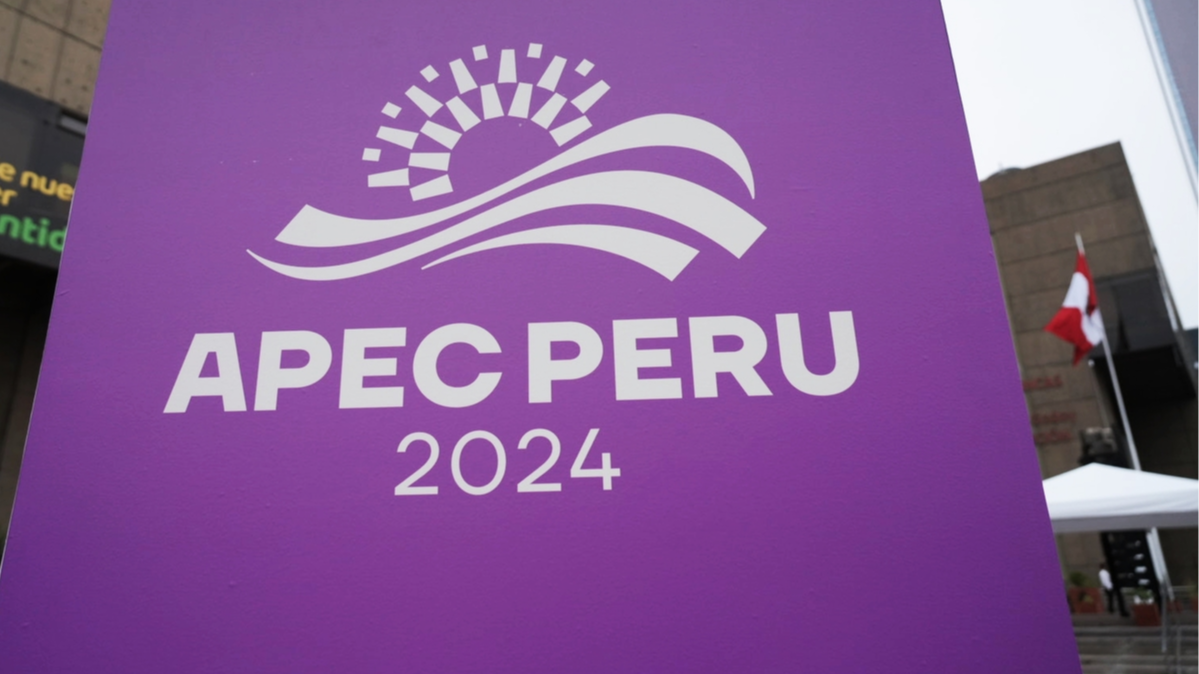
The logo of the Asia-Pacific Economic Cooperation (APEC) 2024 meeting in Lima, Peru, November 8, 2024. [Photo/Xinhua]
By He Xilin
As an important forum for regional economic cooperation, APEC has been a unique and effective incubator of ideas, providing tangible and practical responses to the different challenges the Asia-Pacific region has faced. This week, leaders are gathering in Peru for the third time, emphasizing the sustainability and inclusivity components of a sustainable economic growth agenda and attaining a broader and more inclusive economic integration in the Asia-Pacific region under the theme of "Empower, Include, Grow."
The APEC region represents 40 percent of the world's population, nearly 50 percent of world trade and 60 percent of world GDP, and includes the two largest global economies of the world as well as some of the most high-potential and dynamic developing economies. During the past three decades, the real GDP of the region has increased from $19 trillion in 1989 to more than $64 trillion in 2023, and average tariffs fell from 17 percent in 1989 to 5.3 percent in 2021. As one of the world's largest regional economic cooperation entities, APEC contributes significantly to promoting the economic development and shared prosperity of the Asia-Pacific region and has helped create the "Asia-Pacific miracle" that has staggered the world.
To a considerable extent, the above achievements resulted from the commitment of APEC economies to openness and the "APEC family spirit." During the past "30 golden years," the markets of APEC member economies have become more and more open, as is demonstrated by the significant reduction of trade and investment barriers, step-by-step elimination of non-tariff barriers, and an improvement in market transparency.
While APEC, as a venue for voluntary, non-binding cooperation based on concerted consensus, has not served as a formal vehicle for negotiating free trade agreements, much of the inspiration for such agreements has been associated with the APEC process. APEC itself may not be a rule-making organization, but it has both deepened adherence to multilateralism and inspired more free trade endeavors at the sub-regional or plurilateral levels.
Moreover, the APEC Economic Leaders' meetings held on a regular basis have provided a positive atmosphere for international interaction and integration. As stated by APEC economic leaders at their first meeting in 1993, "the spirit of openness and partnership deepens, enabling us to find cooperative solutions to the challenges of our rapidly changing regional and global economy." This statement still stands true in today's Asia-Pacific.
In the world today, changes on a scale unseen in a century are unfolding at an accelerating pace. The great power competition, geopolitical conflicts, and bloc confrontations impede international cooperation and mutual trust, resulting in mounting challenges for the security and development of the Asia-Pacific region. Rampant politicization and securitization of economic issues, along with increasing unilateral sanctions and technological barriers have further exacerbated the weak global economy. Zero-sum mentality and confrontations lead to beggar-thy-neighbor policies or a "small yard, high fence" strategy, negatively impacting the Asia-Pacific cooperation.
At this historical juncture, all member economies need to think what kind of Asia-Pacific region we should have by the middle of this century. In 2020, APEC leaders proclaimed the APEC Putrajaya Vision 2040, which is committed to building an open, dynamic, resilient and peaceful Asia-Pacific community by 2040, for the prosperity of all our people and future generations.
As an important economy in the Asia-Pacific region, China has been actively involved in APEC cooperation. In line with APEC's "family spirit," Chinese President Xi Jinping had attended 10 APEC leaders' meetings before and put forward the idea of building an "Asia-Pacific community with a shared future featuring openness and inclusiveness, innovation-driven growth, greater connectivity, and mutually beneficial cooperation." From the high-quality implementation of the Regional Comprehensive Economic Partnership (RCEP) Agreement, the conclusion of negotiations on version 3.0 of the China-ASEAN Free Trade Area (FTA), to the vigorous promotion of its accession to the Comprehensive and Progressive Agreement for Trans-Pacific Partnership (CPTPP) and the Digital Economy Partnership Agreement (DEPA), China adheres to open regionalism and endeavors to establish a new system of an open economy at a higher level.
This year marks the 10th anniversary of the 22nd APEC Economic Leaders' Meeting held in Beijing, which is deemed to have been a milestone in the APEC process. Leaders endorsed a series of important documents including the Beijing Roadmap for APEC's Contribution to the Realization of the FTAAP, APEC Strategic Blueprint for Promoting Global Value Chain Development and Cooperation, APEC Connectivity Blueprint for 2015-2025 and APEC Accord on Innovative Development, Economic Reform and Growth, promoting strong, sustainable, balanced and inclusive growth, thereby laying a solid foundation for the Asia-Pacific Partnership for the past 10 years.
As major emerging markets in the Pacific and important members of the Global South, China and Peru shared similar views on Asia-Pacific integration and cooperation. China has been Peru's largest trading partner for 10 consecutive years, and worked closely with Peru within the APEC framework. During this host year, Peru has been steering APEC's work toward greater economic and technical cooperation, especially advancing efforts on the FTAAP agenda, strengthening connectivity and resilient supply chains and fostering quality growth that brings palpable benefits. Highly echoing the Beijing APEC meetings, this year's APEC meeting will deliver a positive signal of building an open and inclusive Asia-Pacific economy. Noting all these efforts, we will have confidence in the next "30 golden years" for Asia-Pacific cooperation.
He Xilin, a special commentator on current affairs for CGTN, is the deputy director of China National Committee for Pacific Economic Cooperation.

 中文
中文



